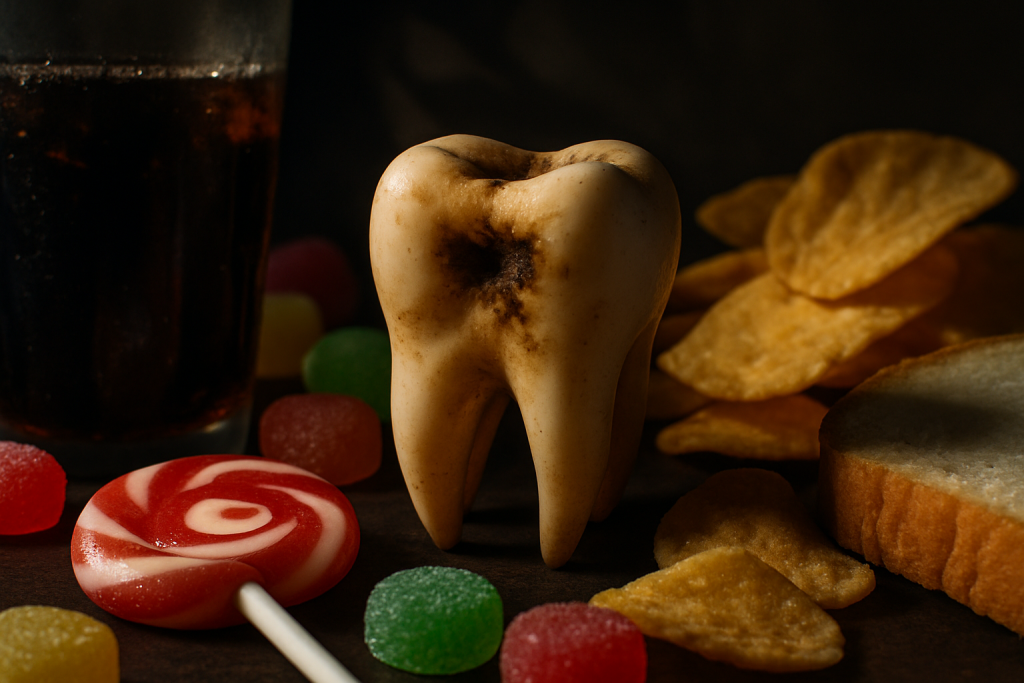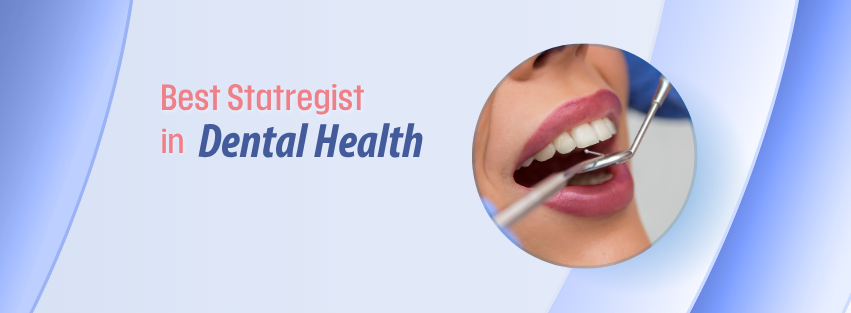
Foods that could damage your teeth and their effects:
When it comes to your dental health, the food you consume plays a significant role. Many foods, while delicious, can be harmful to your teeth and lead to various dental issues. Understanding which foods can damage your teeth enables you to make better dietary choices that protect your smile.
Sugary snacks and candies:
Sugar is a primary culprit in tooth decay. When you eat sugary snacks or candies, bacteria in your mouth feed on the sugars and produce acids that wear down your tooth enamel over time. Frequent consumption of:
- Chocolate bars
- Hard candies
- Cakes and pastries
- Gummy candies
These items can lead to cavities. If you indulge, make sure to brush your teeth afterward or rinse your mouth with water to minimize the damage.
Starchy foods:
Foods high in starch can also be harmful to your teeth. Items like bread, chips, and pasta can easily become trapped between your teeth. When these starchy substances break down, they convert into sugars, leading to acid production just like direct sugary foods:
- Potato chips
- White bread
- Pasta
- Snack crackers
To protect your teeth, it’s essential to maintain your oral hygiene, especially after consuming these types of foods.
Citrus fruits:
Citrus fruits like oranges, lemons, and grapefruits are packed with vitamin C but are also high in citric acid. While they are healthy in moderation, too much citric acid can erode enamel. This makes your teeth more susceptible to decay and sensitivity. It’s wise to enjoy these fruits in moderation and not let their juices linger in your mouth for too long.
Carbonated and sugary drinks:
Soft drinks, energy drinks, and sodas are twofold threats to your dental health. They contain high levels of sugar and carbonation, both of which can lead to tooth erosion and decay. Here’s how they affect your teeth:
- Carbonation contributes to enamel erosion
- High sugar content feeds harmful bacteria
- Acidic drinks lower the pH in your mouth, creating an acidic environment
Consider drinking water or unsweetened beverages instead to keep your teeth healthy.
Dried fruits:
Dried fruits, while often considered a healthy snack, can be full of sugar and stick to your teeth. The sticky texture allows the sugars to cling to your teeth longer, increasing the risk of cavities. If you enjoy dried fruits like raisins or apricots, remember to rinse your mouth with water afterward.
Ice:
Your favorite cold drink may easily lead you to munch on ice, but this habit can harm your teeth. Chewing on ice can chip or crack your teeth, leading to expensive dental repairs. If you’re tempted to chew ice, it may be worth finding a healthy alternative to satisfy a craving for crunch.
Highly acidic foods:
Foods like vinegar-based dressings, pickled foods, and certain condiments can pose a risk to your enamel. The acid in these foods can erode your teeth over time. If you use these items regularly, consider rinsing your mouth with water afterward to protect your teeth.
It’s crucial to understand that while many of these foods can damage your teeth, moderation is key. Practicing good oral hygiene, including regular brushing, flossing, and dental visits, can greatly counteract the effects of these harmful foods. Always keep a balance and listen to your dental health needs.
The role of sugar in dental health:
Your dental health is greatly influenced by your diet, and one of the biggest culprits in tooth decay is sugar. Understanding the role of sugar can help you take steps toward better oral hygiene.
When you consume sugary foods or drinks, you may unwittingly encourage the growth of harmful bacteria in your mouth. Let’s explore how sugar impacts dental health and what you can do to protect your teeth.
When sugar enters your mouth, it interacts with plaque, the sticky layer of bacteria that forms on your teeth. The bacteria feed on sugar and produce acids as a byproduct.
These acids can attack your tooth enamel, the hard outer layer that protects your teeth. Over time, repeated acid attacks can lead to cavities, a common dental issue. To help you understand the process better, consider this:
- Sugar + Plaque = Acid Production
- Acids Attack Enamel = Tooth Decay
Not all foods and beverages are created equal when it comes to their sugar content. Some foods can be particularly harmful to your teeth. Here’s a list of sugar-rich items to be cautious about:
- Soda and Energy Drinks: These drinks pack a double punch with high sugar and acid levels, making them particularly damaging to your dental health.
- Candy and Sweets: Sticky candies cling to your teeth and are hard to wash away, leading to prolonged exposure to sugar and increased decay risk.
- Baked Goods: Pastries and cookies often contain refined sugars and, when combined with carbohydrates, can create an ideal environment for bacteria.
- Fruit Juices: Many commercial fruit juices have added sugars. Though they contain vitamins, the sugar content can still be a problem.
- Ice Cream: While it’s a tasty treat, ice cream is loaded with sugar that can harm your enamel if consumed excessively.
It’s important to note that sugar isn’t the only danger for your teeth. The frequency of consumption plays a significant role in your oral health. Instead of reaching for sugary snacks, consider healthier options like:
- Fresh Fruits: They contain essential vitamins and minerals while providing a natural sweetness.
- Nuts: These can help in keeping your teeth strong due to their nutrient content, and they do not damage enamel.
- Plain Yogurt: Low in sugar and high in calcium, yogurt can support your dental and overall health.
- Cheese: It not only offers a tasty option but also helps neutralize acids and protect enamel.
Your choices directly impact your dental health. By being mindful of sugar consumption and understanding its effects, you can help protect your teeth from decay and maintain a beautiful smile. Make changes to your eating habits today, and your teeth will thank you tomorrow!
Acidity and Its impact on tooth enamel:
Your smile is one of the first things people notice about you, and maintaining healthy teeth is essential for that radiant look. One of the biggest threats to your teeth comes from the acidity found in certain foods and drinks.
Acidity can harm the protective layer of your teeth, known as enamel. Understanding this relationship can help you make better choices for your oral health.
Tooth enamel is mostly made of minerals, and it’s the hardest substance in your body. However, it can still be vulnerable to the acids found in various common items. When the enamel erodes, your teeth may become sensitive and more susceptible to decay. Let’s take a closer look at how acidity impacts tooth enamel.
Sources of acidity:
Many foods and beverages can be acidic, including:
- Fruits: Citrus fruits like oranges, lemons, and grapefruits have high levels of acidity. Their juices can contribute to enamel erosion if consumed excessively.
- Soft Drinks: While sodas are known for their high sugar content, they are also highly acidic. Both diet and regular sodas can be harmful to enamel.
- Sports and Energy Drinks: Often marketed as a way to replenish electrolytes, these drinks can also contain high levels of acidity, making them dangerous for your teeth.
- Wine: Red and white wines both contain acids that can weaken enamel over time.
- Vinegar-Based Foods: Salad dressings and other foods that contain vinegar can also erode tooth enamel.
How acidity affects your teeth?
Constant exposure to acidic foods and drinks can lead to enamel erosion. Here’s how it happens:
- Immediate Effect: When you consume something acidic, the pH level in your mouth drops, which increases the acid attack on enamel.
- Long-Term Damage: Repeated exposure can lead to significant enamel loss, which may not happen overnight but can accumulate over time.
- Increased Sensitivity: As enamel wears away, you may experience sensitivity to hot, cold, or sweet foods. This can lead to discomfort when eating or drinking.
- Higher Risk of Cavities: With less enamel protecting your teeth, you become more susceptible to cavities and other dental issues.
Protecting your enamel:
Preventing enamel erosion due to acidity doesn’t mean you have to give up the foods you love. Here are some effective strategies to protect your teeth:
- Drink Water: Rinse your mouth with water after consuming acidic foods or drinks. This helps neutralize acids and wash away residual sugar.
- Use a Straw: When drinking acidic beverages, using a straw can help direct the liquid away from your teeth, reducing contact with enamel.
- Wait Before Brushing: After eating acidic foods, wait at least 30 minutes before brushing your teeth. Brushing too soon can further damage softened enamel.
- Choose Whole Fruits: Instead of drinking fruit juices, opt for whole fruits. They have fiber that helps scrub your teeth and less acid than their juiced counterparts.
- Opt for Low-Acidity Alternatives: When possible, choose low-acidity options. For instance, try milk instead of soft drinks.
Snacking habits that harm your oral hygiene:
Maintaining good oral hygiene is crucial, and understanding how your snacking habits can impact your teeth is a key step in achieving that. Some snacks can significantly damage your teeth, leading to cavities, decay, and other dental problems. Let’s take a closer look at some common snacking habits that may harm your oral health.
Sticky treats:
Sticky snacks, like caramel, taffy, and gummy candies, can be particularly harmful to your teeth. These sugary delights tend to cling to your teeth, making it harder for saliva to wash them away. When sugar lingers on your teeth, it feeds harmful bacteria, leading to plaque buildup and cavities.
Citrus fruits:
While fruits are generally good for your health, citrus fruits like oranges, lemons, and grapefruits can be detrimental to your enamel. The high acidity in these fruits can erode tooth enamel over time. If you enjoy citrus fruits, consider rinsing your mouth with water afterward to neutralize the acidity and protect your teeth.
Soft drinks and sugary beverages:
Drinking soft drinks and sugary beverages can greatly impact your dental health. These drinks not only contain high levels of sugar, but they are also acidic. The combination of sugar and acid can cause enamel erosion and lead to cavities.
Potato chips:
Crunchy snacks like potato chips are another sneaky culprit harming your teeth. The small particles can get trapped between your teeth, which can create a perfect environment for bacteria to thrive.
Not only that, chips are often high in starch and can lead to the same issues as sugary snacks. Consider healthier options like popcorn or sliced vegetables instead.
Cookies and pastries:
Indulging in cookies, cakes, and pastries is a common snacking habit, but these treats can wreak havoc on your teeth. They are loaded with sugar and tend to break down into sticky residues that cling to your teeth. If you enjoy sweets, pair them with a glass of water to help rinse your mouth afterward.
Dried fruits:
Dried fruits may seem like a healthy snack option, but they can be high in sugar and often sticky. Raisins, apricots, and figs tend to stick to your teeth just like candies. The sugar content can contribute to tooth decay if you don’t follow up with good oral hygiene.
Instead of dried fruits, munch on fresh fruits when possible for a safer alternative.
Eating between meals:
Frequent snacking throughout the day can pose a threat to your oral hygiene, especially if the snacks are sugary or starchy. Each time you snack, your teeth are exposed to sugar, which creates an acid attack that weakens enamel. Try limiting snacks to specific times rather than grazing throughout the day.
Ways to improve your snacking habits:

Here are some simple tips to help you maintain better oral hygiene while snacking:
- Choose crunchy fruits and vegetables, like apples and carrots, which can help scrub plaque off your teeth.
- Opt for nuts or cheese, as they can help neutralize acids and provide calcium for your teeth.
- Limit sticky and sugary snacks to special occasions and pair them with water.
- Remember to brush your teeth regularly, especially after consuming snacks that can harm your teeth.
- Keep sugar-free gum on hand to chew after snacks; it helps increase saliva flow and wash away bacteria.
By being mindful of your snacking habits and making healthier choices, you can significantly reduce your risk of tooth decay and maintain good oral hygiene. Whenever possible, think about how your snack choices impact your teeth and adjust accordingly for a healthier smile.
Watch out for starchy foods:
Foods high in starch, like chips, bread, and pasta, can also be harmful. Similar to sugar, they break down into sugars that can stick to your teeth. This puts you at a higher risk for tooth decay. Here are some ways to manage starchy foods:
- Eat whole grain options whenever possible.
- Brush your teeth after consuming starchy snacks.
- Drink plenty of water to help wash them away.
Be cautious with hard foods:
While hard foods like nuts and hard candies can be healthy, they can also pose a risk to your teeth if you’re not careful. Biting down too hard can result in chips or cracks in your enamel. To protect your teeth, consider these tips:
- Be gentle when biting into hard foods.
- Consider chopping hard foods into smaller pieces to minimize strain.
- Choose softer alternatives when available, like nut butters instead of whole nuts.
Stay away from ice:
It may seem harmless, but chewing on ice can seriously damage your teeth. The hardness of ice can crack your enamel and even lead to painful dental issues. If you find yourself tempted to chew ice, try these healthier habits:
- Choose soft foods or snacks instead of ice.
- Stay hydrated with drinks that are not freezing-cold to curb the craving.
- Keep your mouth busy with sugar-free gum to avoid chewing ice.
Limit drinks with added sugar and acid:
Sodas and energy drinks can wreak havoc on your teeth due to their high sugar and acidity levels. Regular consumption can lead to enamel erosion and cavities. To protect your teeth better:
- Opt for water, herbal teas, or milk instead.
- If you indulge in sugary drinks, use a straw to minimize contact with your teeth.
- Always brush your teeth afterward if you have consumed a sugary or acidic drink.
Conclusions:
Maintaining healthy teeth involves being mindful of what you eat and drink. Foods that can damage your teeth often include those high in sugar and acidity. Sugary snacks and beverages create a breeding ground for harmful bacteria that produce acids, leading to decay. Similarly, acidic foods and drinks, like citrus fruits and sodas, can erode tooth enamel, reducing your teeth’s natural defenses.
To protect your smile, it’s essential to adopt some preventive measures. Rinse your mouth with water after consuming acidic or sugary foods, and maintain a regular brushing routine with fluoride toothpaste.
Additionally, try to limit the intake of acidic drinks and choose snacks that promote dental health, such as cheese, nuts, or crunchy vegetables.
